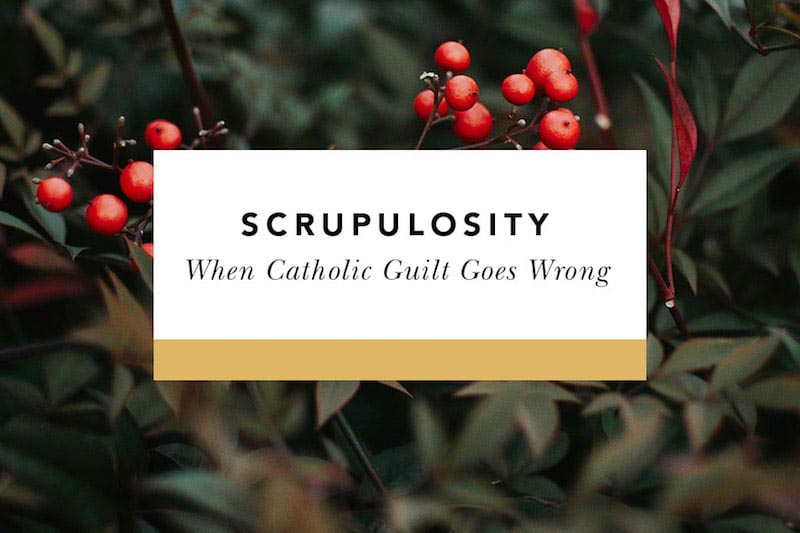
The word scrupulous is usually used to describe someone who is extremely thorough and attentive to detail. It’s meant to be a compliment. However, for many Catholics, being scrupulous is something else entirely.
What is Scrupulosity?
Scrupulosity is a type of religious OCD which is becoming more and more common. For those who have never experienced this themselves, imagine a dose of “Catholic guilt” on steroids. It’s more than having a guilty conscience; it’s having a crippling conscience. A person who is suffering from scrupulosity becomes obsessed with their most insignificant weaknesses and sins, so much so that it becomes their primary preoccupation.
With this mindset comes an intense fear of failing God, which results in the inability to make even minute decisions. More than anything, these persons desire to please God and follow His commandments, yet they remain convinced of their constant failure. Because of this, it’s hard - almost impossible - to have a loving, personal relationship with God. Prayer and the sacraments put them face-to-face with anxiety and despair.
My Experience with Scrupulosity
My scrupulosity manifested when I was eighteen years old, the end product of a manipulative relationship.
Because of the abuse, I couldn’t function properly. I didn’t trust my own understanding of reality enough to make decisions. At the same time, I was growing in my faith and wanted so badly to be the woman God wanted me to be. My life centered around being sinless. I only wanted to please God, but I was convinced that any little mistake would have a cosmic impact on my personal salvation.
I became diligent, thorough, and attentive to detail with every single aspect of my life. I couldn’t stop myself. If I failed to meet my own standards I became paralyzed with guilt. I was sure that every single failure on my part was a mortal sin.
Even mishaps that weren’t my fault had a crippling effect. Once, knowing that I wanted to attend the noon Mass on my college campus, I made sure that I finished my lunch within the time frame needed to keep the fast. Halfway through Mass, a piece of spinach dislodged itself from in-between my teeth. Without thinking, I swallowed it. Looking back now, I know that I had done nothing wrong and I still could have received Communion. Unfortunately, the sickness had too strong a hold on me. I was convinced that I had violated the fast. I panicked and had a full-blown anxiety attack because I was unable to receive Him.
Scrupulous Saints
If you’re someone who is struggling with scrupulosity (and maybe you didn’t even know it until now), please know that you are not alone. Many canonized saints have struggled with scrupulosity and self-condemnation.
St. Maximilian Kolbe’s scrupulosity was so severe that his superior assigned a fellow priest to accompany him throughout his day. Anytime Maximilian had a condemning thought, he was required to voice it to his brother priest. This priest would then show Maximilian where his feelings had led him astray.
St. Alphonsus di Ligouri, bishop and Doctor of the Church, is said to have exhausted every confessor in Naples in his search for relief from his own condemning thoughts.
Other scrupulous saints include St. Therese of Lisieux, St. Katherine Drexel, St. Francis de Sales, and St. Ignatius of Loyola. They are proof that with the help of God’s grace, we can truly find relief from this burden of scrupulosity.
Healing from Scrupulosity
In addition to the example of the saints, here are five things that assisted me on my own path to healing.
1. Total Consecration to the Blessed Virgin Mary
Convinced that I was a hopeless sinner, I turned to the Blessed Mother. I had heard good things about consecrating oneself to Our Lady, but I was most interested in her protection. Since I was fairly certain that I was going to hell, I thought that “buddying-up” with Mary might increase my chances of making it to heaven.
Ironically, I almost didn’t follow through with the consecration. I didn’t feel as though I had been zealous enough in my prayer. I was ready to redo it all but my confessor forbid it. Out of obedience to him, I finished my consecration. In all sincerity, I felt a change in myself the very next day. It was no fix-all, but I was no longer in the depths of despair.
2. The St. Benedict Medal
Self-condemnation is a symptom of scrupulosity. After my consecration, I started to be able to decipher between God’s voice and the voice of the enemy. Around the same time, I was also introduced to the St. Benedict medal. Containing many different blessings and prayers, my favorite aspect of the medal appears on the back. The Latin reads, “Vade Retro Satana, Nunquam Suade Mihi Vana — Sunt Mala Quae Libas, Ipse Venena Bibas.” In English this means:
Be gone Satan! Do not tell me your lies. Evil are your words, drink your own poison!
Whenever critical thoughts began to surface, I found myself repeating these words and I experienced some relief.
3. The Grace of the Sacraments
When you’re dealing with scrupulosity, church might be one of the last places you want to be. However, because you’re in need of healing, church is exactly where you need to be. For me, frequenting the sacraments despite my intense fear of God was my greatest act of faith in God’s mercy.
Monthly confession helped me to trust in God’s clemency. It also made it clear to me that many of the things I was confessing weren’t actually sins. Once, as a penance, the priest even told me to “stop doing that” in regards to my self-condemnation. It worked. After all, I had to obey him if I wanted to be forgiven.
The Eucharist became my life-blood, and gave me a whole new understanding of the sacrifice of the Mass. Never in my whole life had I prayed these words so fervently: “Lord, I am not worthy to receive you, but only say the word and I shall be healed.” After four months of receiving the Eucharist daily, I realized a change had taken place in me; I was far less anxious throughout my day.
Lastly, asking a priest to administer the Anointing of the Sick was one of the smartest things I did. Scrupulosity is an illness, and this sacrament exists specifically to help those individuals who are struggling because of physical and mental ailments. It helped me to accept my cross and unite my sufferings with Christ. I actually felt better physically because of these graces.
Frequenting the sacraments...was my greatest act of faith in God’s mercy. #BISblog //Click to tweet
4. Personal Prayer
This is one of the most beneficial things I did for myself. By spending time talking with God intentionally every day, I learned to recognize His voice. A personal relationship slowly blossomed. I learned that He is good and loving, not Someone who is waiting to judge my every move.
5. Professional Help
Unable to find a licensed medical professional in my area, I sought out a spiritual director. He was able to help me see that my scrupulosity was the result of incorrect patterns of thought that had been ingrained as habit. For me, these thought patterns had developed during that abusive relationship. Without the assistance and affirmation of this priest, I would not have been able to move forward as quickly in my healing process.
Spiritual directors and mental health professionals are trained to specifically help individuals who find themselves in these types of situations. If you have access to a priest or religious who is also a mental health professional, that would be the ideal. If you find yourself in a similar situation, do not be ashamed to reach out for help.
If you’re someone who struggles with scrupulosity, please do not despair. There is hope. There is relief. You can beat this. Just stay close to Jesus.
Have you ever struggled with scrupulosity? How did you overcome it?
Scrupulosity: When Catholic Guilt Goes Wrong #BISblog //Click to tweet
![]()









